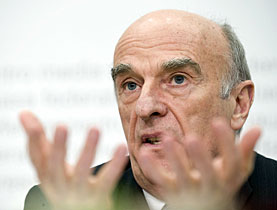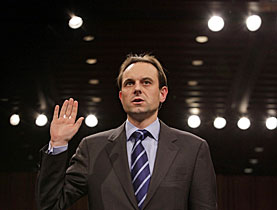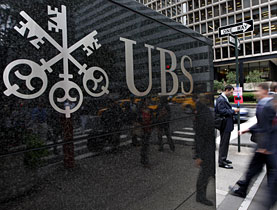Tax talks offered, but bank secrecy upheld

Finance Minister Hans-Rudolf Merz says the government is willing to improve international cooperation to combat tax offences.
However, he said Switzerland’s banking secrecy remains intact. A group of experts will advise the government on possible measures to counter the pressure on the country’s financial centre.
The leading Swiss bank, UBS, is in a showdown with the United States over alleged tax fraud by American tax dodgers. European countries are also threatening to blacklist Switzerland when the world’s leading 20 economies meet in London next month.
Merz said the government is prepared to offer a dialogue with third countries on the taxation of savings, similar to the deal with the European Union – Switzerland’s main trading partner.
Addressing a news conference following Friday’s cabinet meeting, he made clear that Switzerland expects other countries to show the same degree of willingness to consider reforms.
The minister, who is also this year’s Swiss president, refused to say whether the government would agree to decouple secrecy and tax evasion.
He added that the group of experts, led by senior foreign ministry official Manual Sager, would examine the situation. First results are expected in two weeks.
“Switzerland’s financial centre has to remain competitive. But we have to throw off ballast which could threaten not only its own future, but also that of the country’s economy,” Merz said.
Cherished secrecy
He said Switzerland’s open-mindedness was the right way to proceed in the face of international pressure “without giving up our own convictions, values and achievements.”
Merz said the Swiss cherished the traditional banking confidentiality and the privacy of citizens from unwarranted state intervention. “Therefore the government will continue to retain banking secrecy.”
He reiterated that the purpose of banking secrecy was not to provide cover for tax offences.
Merz rejected criticism and threats by other countries over Switzerland’s tax laws.
“We consider the criticism unjustified. Switzerland is not a tax haven. It has an efficiently-functioning tax system and imposes normal taxes while striving to maintain competitive rates,” he said.
The bilateral and multilateral agreements concluded with the European Union and more than 70 individual countries are the basis for an exchange of information for tax purposes. They comply with contractual obligations, according to Merz.
Finance experts have said Switzerland’s battered banking sector cannot get back on track unless the issue of tax evasion is settled.
They advised the Swiss government to try and buy time. It would allow the banks to change strategies and change revenue activities.
The government statement met a mixed response by the main political parties. The centre-right Radicals and Christian Democrats as well as the Business Federation and the Bankers Association welcomed the cabinet announcement.
But the centre-left Social Democrats and the rightwing Swiss People’s Party accused the cabinet of failing to act swiftly and present a convincing policy.
Diplomatic offensive
The cabinet has launched diplomatic offensive to pre-empt sanctions by industrialised nations and resolve a legal case with the US.
UBS is under intense pressure by the US justice authorities to hand over confidential data of about 50,000 clients.
Last month UBS paid $780 million (SFr915 million) in fines to the US authorities and supplied details of up to 300 bank customers during an investigation into alleged tax fraud.
Foreign Minister Micheline Calmy-Rey met the American Secretary of State, Hillary Clinton, in Geneva on Friday.
Speaking to the media after the meeting, which she described as friendly and fruitful, Calmy-Rey said she indicated to Clinton that Switzerland was ready to study a possible extension of its tax cooperation and would soon make more precise proposals.
“I also said it was not in our common interest for the situation to escalate further as UBS is responsible for 30,000 jobs in the US … and the bank’s difficulties could weaken the international financial system.”
For his part, Merz hopes to hold separate talks with the US finance minister, Timothy Geithner, at an international conference in London later this month. He is also due to meet his counterparts from Austria and Luxembourg, two European Union member states with forms of banking secrecy.
The finance ministry said Sunday’s meeting in Luxembourg was aimed at coordinating a common policy to defend the interests of financial centres against, amongst other things, the introduction of a possible blacklist of so-called tax havens.
swissinfo, Urs Geiser
People wishing to dodge paying taxes on their assets can do so by three means: avoidance, evasion and fraud.
Avoidance is the legitimate means of structuring finances so they don’t fall under the scope of taxable assets. This can be done, for example, by setting up a trust fund or by changing country residence or nationality.
Evasion is the deliberate concealing the true state of assets from the tax authorities – in other words, lying about the extent of your assets. This is a civil offence in Switzerland and some other countries, such as Austria and Liechtenstein, but criminal in most states.
The main distinction between evasion and fraud is that the perpetrator tells lies on official documentation. Unless tax fraud can be proved, Swiss banks are not obliged to hand over details of client assets to investigators. In some cases this information is needed before fraud can be established in the first place.

In compliance with the JTI standards
More: SWI swissinfo.ch certified by the Journalism Trust Initiative













You can find an overview of ongoing debates with our journalists here . Please join us!
If you want to start a conversation about a topic raised in this article or want to report factual errors, email us at english@swissinfo.ch.